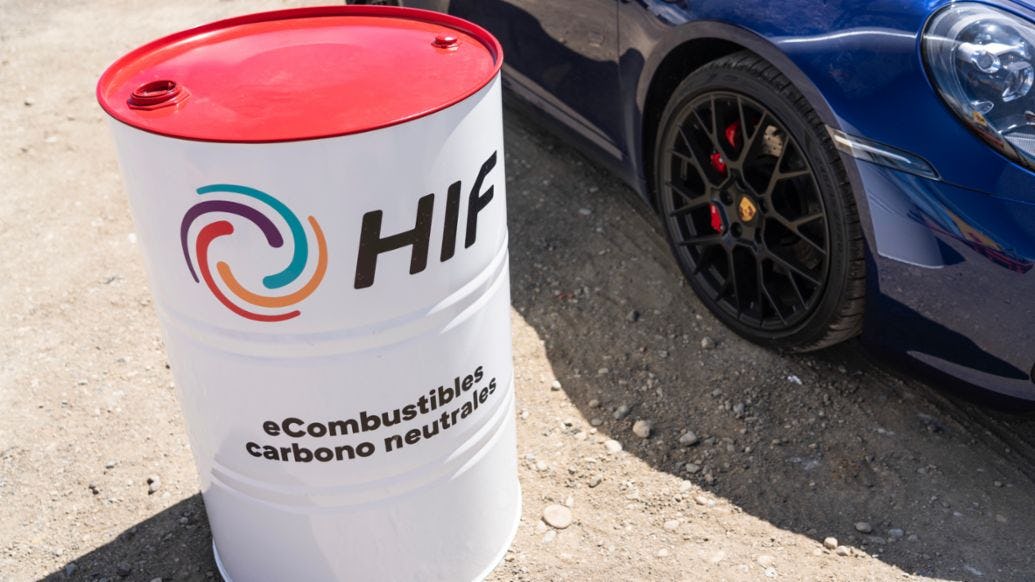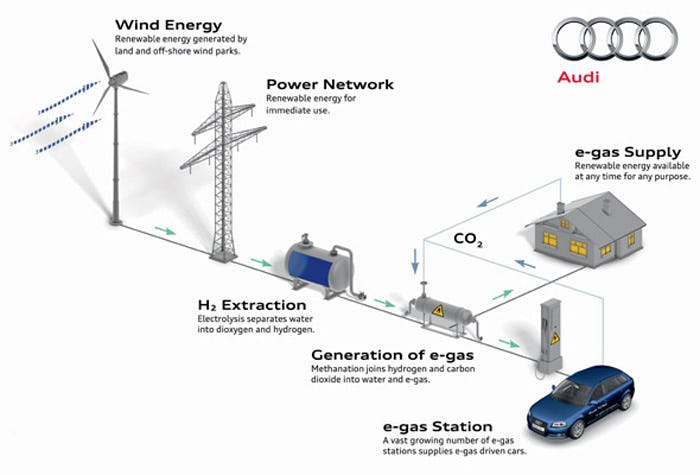
Electrification is all the rage amongst car brands these days, with many of them setting lofty goals of only selling electric vehicles by 2035 or earlier. The future looks promising in terms of EV options for the typical driver, but there’s still a whole stock of existing vehicles and certain industries that rely on burning gasoline.
When looking at the transportation industry and its use of ships and planes, many commercial fleets can’t be easily converted to electric. That’s where e-fuels come in and offer those who still rely on gasoline a greener way to refuel. E-fuels are still a very nascent method of creating gas, but it has already garnered both support and criticism. Here’s everything you need to know about e-fuels.
WHAT ARE E-FUELS?
E-fuels are synthetic fuels made through a process of combining captured CO2 with hydrogen that has been split from water. Those making e-fuels generally use sustainable methods to extract hydrogen from water, like wind, solar, or nuclear power. Combined with capturing the existing CO2 in the atmosphere, proponents argue that e-fuels are designed to be a more sustainable alternative.

The end result of the process gives you synthetic fuel that runs in your vehicle just as normal gasoline would. Those who support e-fuel say that the captured CO2 balances out the CO2 released from burning the synthetic fuel, making it carbon-neutral. Burning e-fuel still isn’t as clean as running a zero-emissions vehicle, like a battery-powered EV, but it may be the only viable option for certain demographics.
HOW WOULD WE USE E-FUELS?
Most of us may be gearing up to switch over to an EV when we buy our next daily driver, but there are still a ton of existing ICE cars out there that people rely on. In those cases, using e-fuel would help reduce your carbon footprint even though you’re still using a traditional engine.
On the commercial side, there are many company fleets of delivery trucks or vans that would be impractical to upgrade to EVs. On an even larger scale, there are many ships and planes that still rely on traditional fuel to power their engines. While EV adoption has been going strong, there are still growing pains that e-fuels could address.
WHERE DO YOU GET E-FUEL?
Even though e-fuels are surfacing in the conversation of greener transportation, it’s still not something you can pull into any gas station and request. Being relatively new to the market, we’ve only seen an e-fuel plant in Chile open recently, which was backed by Porsche. Norsk e-Fuel is also planning for an e-fuel plant in Norway in 2024, but it will be more focused on providing the aviation industry with this carbon-neutral option.

WHAT ARE THE DRAWBACKS OF E-FUEL?
With so few plants producing e-fuel currently, the scarcity of this synthetic alternative is a serious concern. The scarcity issue could lead to expensive prices for e-fuel, at least until more plants are built and producing e-fuel consistently.
Still, many climate activists are criticizing e-fuel as a stopgap for making ICE vehicles obsolete, when companies and governments should be fully pushing toward electrification instead of finding cleaner solutions that are still creating emissions. Groups like Transport and Environment, a clean transport campaign group in Europe, say that using e-fuels will only delay the inevitable transition to a fully electric transportation industry.
WHERE ARE WE WITH E-FUEL ADOPTION?
This is where things get a little complicated. It’s clear the European Union and several U.S. states want only EV sales by 2035, meaning a hard stop for ICE engines. However, the European Union’s goal puts it at odds with Germany, which wants to ensure that certain sectors don’t get left behind.
The European Union and Germany recently reached an agreement where the country is allowing the registration of new vehicles with ICE engines, even after 2035, but they’re required to use only e-fuel. We’re still waiting to see how this plays out stateside, but it’s likely to be just as controversial as it is currently unfolding overseas.
Of course, there are plenty of car brands that support the development of e-fuels, including the aforementioned Porsche, as well as BMW. However, other car brands like Volkswagen and Mercedes-Benz aren’t interested in developing e-fuels, instead deciding to fully direct their efforts toward the greener option of battery-powered EVs.







